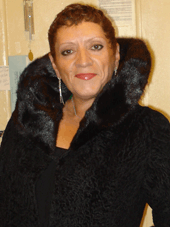
I've dealt with many challenges: drug abuse; alcoholism; domestic violence, psychological and physical (coming from a dysfunctional family where my dad, an alcoholic, always beat my mom, I've had boyfriends and girlfriends who used to hit me); no support system; and all the stigma. I buried my sister and two brothers; I lost all three of them to AIDS. I lost my mom to breast cancer. I felt alone. I run into many people who feel the same. But you know what? All these obstacles helped me get stronger and always come out on top.
My son was 9 years old when I was diagnosed, but I didn't disclose to him until he was 12 years old since I didn't want my condition to interfere with his school work. I wanted him to concentrate on going to school and pursuing college. I did not want to leave him alone. Today he's 27 years old; he graduated with a bachelor's degree and has a great job in the financial sector on Wall Street. He is happy to see that I'm still alive. He has his own apartment, car, a great circle of friends, and he travels a lot. We go out to many places together and celebrate life; we just celebrated July 4th in the Poconos.
I raised my son with great values. He doesn't do drugs or alcohol, or smoke cigarettes. I'm so proud of him; my circle of friends and family are always telling me he's such a good son. He is my greatest support system; he inspired me to do what I do today. He used to tell me a lot of times, "Mom, why don't you go out there and do something -- rather than complain about it?" So I took his advice! I changed my lifestyle, went to school, got a job, and now I love helping others empower themselves. I have done everything I wanted to do prior to getting the virus. I have gone on a vacation, on a cruise, horseback riding, and in August I'm going away again.
I have received awards for what I do, and hope to God I can help end this epidemic and get people to listen and practice safer sex, to keep as many as possible from getting infected.
I would advise people just starting HIV treatment to seek help in maintaining a healthy lifestyle. Seek a support system. Attend groups, listen to what others are saying about their experiences, ask for suggestions, ask questions, be very curious about the different types of medications and their side effects. Ask your doctor to help you find the medication that will work with your lifestyle (for example, if you're active and always on the go, get a medication that's taken once daily). Take into consideration what will work for you.
Reevaluate your priorities: What is important to you? Living a healthy life? Hiding and living in denial for the rest of your life? Do you want to be happy or do you just want to make others happy? It's all about you; you are living with a virus that can be easily controlled but you need to make the correct choices; seek help in making these choices.
I hope I can help others make a wise choice, and a healthy one. AIDS is not a disease; it's an adjustable lifestyle that can work for you if you make it work.
Lillibeth Gonzalez works as a peer health educator at Gay Men's Health Crisis, Inc. (GMHC), one of the world's first and largest providers of HIV/AIDS prevention, care and advocacy.
Lillibeth's testimony first appeared on August 17 in thebody.com.

No comments:
Post a Comment